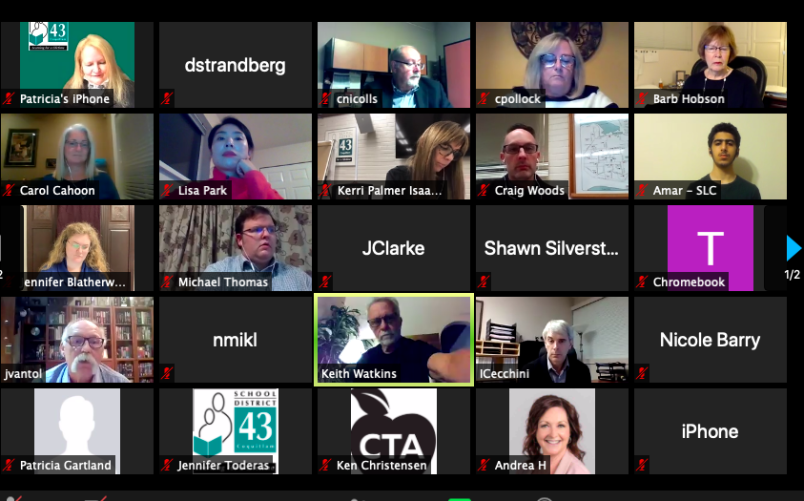The risks of using Zoom for public meetings was on full display Tuesday night when a young hacker photobombed Tuesday’s school board meeting wearing first a costume and later nothing but his underpants.
But despite the hack that disrupted the meeting for a few minutes and sent a technology education official scrambling for a fix, board meetings will continue to be held on the online platform.
Board chair Kerri Palmer Isaak said the benefits of increased public participation outweighed the risks of Zoom and that meetings would continue to be held via the online platform for the foreseeable future.
“The feedback we have received in being more available and more accessible and having more people watching outweighs the interruptions,” Palmer Isaak said, in response to a question from the Tri-City News.
However, she stressed the district would do what it can to “control the virtual environment in the future.”
“We don’t want to diminish or take away from the incredible resource we have,” Palmer Isaak further added.
Still, the photobomb incident caused a bit of an interruption, delaying a presentation by director of instruction Stephen Whiffin, who was preparing to speak on the district’s use of technology during the pandemic.
When Whiffin returned to present his slide show, he acknowledged the problem of someone being able to hack into the meeting and said it was one of the risks of using Zoom which has the advantage of providing access to the public.
“I had some firefighting to do here, unfortunately,” Whiffin said noting the discomfort the hack must have caused.
“None of us want to see … [meetings] interrupted by people who are not using technology appropriately,” Whiffin said.
Whiffin did not provide details on how the intrusion occurred.
Typically, members of the general public are not able to participate in the meeting as their video and audio are muted by the meeting administrator.
However, despite the effort to eliminate disruptions, a youth wearing a Batman-like costume and mask and holding a giant Nerf Blaster said a racial slur and began talking over superintendent Patricia Gartland, who was making a presentation on international education.
The video lasted about 15 seconds before it was turned off, leading board chair Palmer Isaak to apologize to the approximately 45 meeting participants.
“Obviously some people are very skilled with technology,” Palmer Isaak said.
In a second interruption later in the meeting, a voice could be heard saying “Korean bump” and a video was shown of someone in his underpants. It too lasted about 15 seconds before it was shut down.
Whiffin took the opportunity to point out that while someone was able to hack into the Zoom meeting, student online activity in schools is much more protected because they have to provide authentication, creating a “closed environment.”
The surprising security lapse during the online meeting is not the first strange Zoom occurrence. In Port Moody, a councillor who thought her microphone was turned off expressed profanities, leading to the establishment of an online code of conduct.
Port Moody, Coquitlam and Port Coquitlam have all since resumed in-person council meetings, although the meetings are taped so people can watch them later.
SD 43 meanwhile has decided to keep its meetings virtual during the pandemic, with trustees agreeing to the use of the online platform instead of returning to open meetings because of COVID-19 concerns and the tendency of more members of the public to participate.
While the photobomb incident provided a few moments of frustration, especially for superintendent Patricia Gartland, who was interrupted mid-presentation by the youth, the meeting was otherwise an effective use of Zoom, with slideshows, discussion and public questions occurring without incident.
Still, Gartland took a few moments to respond to the racist slur during her presentation, noting education can help to eliminate racism and bigotry, before extolling the benefits of the international education program in creating global citizens.
In contrast, she noted, the photobombing youth was displaying racist overtones that were not acceptable.
“What they are doing is horrible to people,” Gartland said.
As the district continues to push ahead with online meetings, when it comes to the use of technology for class, the district is seeing a reduction in the numbers of students learning remotely. In his presentation, Whiffin noted that about 1,900 students are participating in the gradual transition program, most of them elementary students, down from 2,700 at the beginning of the school year.
Students are using a blend of online platforms to learn at home, including Microsoft Teams, Fresh Grade and email, with some students attending school part-time and doing the rest of their school work at home.
More laptops and iPads are being purchased as schools embrace technology, and this summer 2,700 new devices were deployed across the district.
As well, 1,000 older but still serviceable devices were distributed this fall to ensure every family has access to technology.
In his presentation, Whiffin said beefing up online security is an ongoing issue and critical for the district in managing technology in schools.
Read more from the Tri-City News



